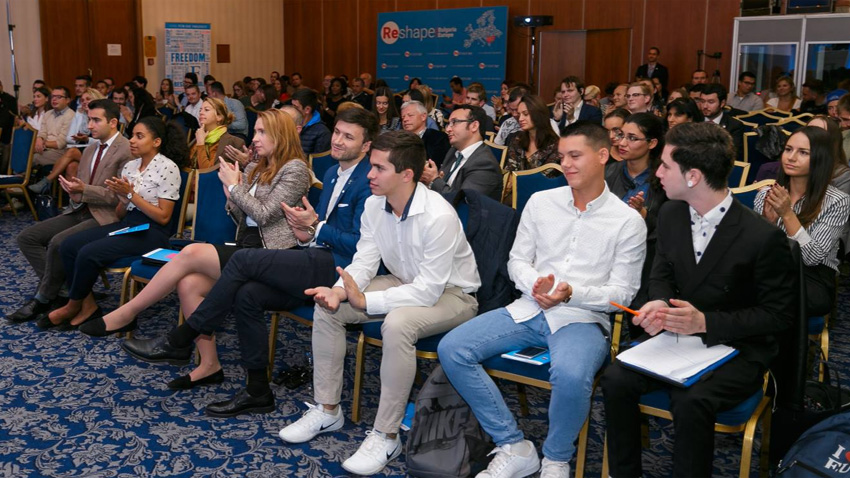The Friedrich Naumann Foundation held an international conference under the motto Reshape Bulgaria/Europe in Sofia. The young Bulgarians had the chance to raise certain issues and their questions were targeted at acting political leaders and MPs. The discussion was grounded on a resolution, prepared by 1,000 Bulgarian students, outlining the top 5 problems, entailing however many others. The issues within the system of justice, corruption, the educational crisis, the one in the healthcare system and last but not least – the mass apathy and lack of trust towards politicians – those were the accents.
Here is the opinion of Daniel Kaddik, Head of the bureau of Friedrich Naumann Foundation for Southeast Europe, in an interview for Radio Bulgaria:
There is no doubt that corruption remains the leading subject for public discussions of that kind. The phenomenon was defined as office abuse, where clerks receive money in exchange for services. “We came to the conclusion that corruption was widespread across the country and no public sector remained unaffected,” says Yoanna Dermendjieva, 23, a recent university graduate in Germany.
“We established that low incomes and people’s mentality were the main reasons for corruption – everybody thinks that money solves any problem. Unfortunately corruption has remained unpunished here for years and hence for the domino effect. As media cover cases of corruption the society takes that for a common practice, allowed for all. Then we naturally ask ourselves whether this is a state of the law. Even the system of justice feeds such practices, often cooperating with corruption instead of fighting against it. Justice is not guaranteed. Investors see this situation as a major obstacle for their intentions and, on the other hand, many young experts get motivated to leave their country. There are three major spheres where Bulgaria has to get an urgent reshape: justice (in particular curbing corruption), healthcare and education. That is where the major problem lies and hence for the apathy and demographic crisis.”

The politicians’ team consisted of representatives of the three major political formations which have long now governed this country. GERB was represented by Deputy Foreign Minister Georg Georgiev, the socialists had sent Deputy Chair of BSP on International Policy Denitsa Zlateva and the Movement for Rights and Freedoms – Deputy Chair of Parliament Nigyar Djafer.
“Not the whole country needs reshaping, but the major spheres mentioned,” said Georg Georgiev, GERB. “I found it most difficult to talk in front of those young people, as they don’t tolerate any waste of their time. I see the key as the building of self-confidence – the state is now among Top 5 in Europe in terms of fiscal stability and over the past 27 years we have all worked for its NATO and EU membership.”
“We need to establish a social feeling of continuity, of sustainability,” said Denitsa Zlateva, BSP. “We witness the total changes within the executive, legislative and judicial authorities with each new government. The mistake of the politicians is that we begin reforms in accordance with our own party views, but we cannot guarantee continuity and sustainability.”
“I hail you for the accents and mostly for the 5th one – social apathy,” said Nigyar Djafer, MRF and added: “The demographic crisis is the main crisis that we are going through today. Young people leave the country due to the lack of reforms and future here. At the same time there is this huge crisis of values, in people’s relations and in hate speech used by political leaders, media, citizens…”
English version: Zhivko Stanchev
"We cannot escape from modern technologies, but we must think about how we can use artificial intelligence to improve the quality of education without losing human contact," said Mimi Nicheva, head of the Bulgarian Sunday School "Sts...
Nearly two centuries ago, in the distant 1838, the Bessarabian Archbishop Dmitry Kishinev and Khotinsky consecrated the magnificent Orthodox church "The Holy Transfiguration of the Lord" , built with voluntary donations and labor by the Bulgarian..
Bringing youthful energy, colour and cheer to the Bulgarian National Radio studio, students from the Bulgarian Sunday School Dr Petar Beron arrived from Larnaca. The group from Cyprus — 16 pupils aged between 14 and 19 — is currently on a week-long..
Under the motto "Responsibility, Unity and Security" on November 5 and 6, 2025, a German-Bulgarian seminar for journalists and public..
On 27 October, the first meeting of Action CA-24150 “Values in Turbulent Times: Navigating Social Change and Challenges (VISTA)” took place in Brussels...
The European Commission praise s Montenegro’s progress toward EU membership North Macedonia needs decisive action and reforms to begin..

+359 2 9336 661
